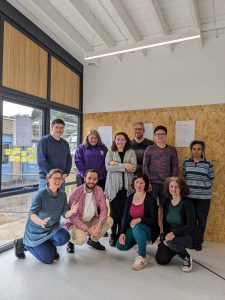The SACHI group are very pleased to announce the below PhD scholarship opportunity.
Title: Designing Techno-Cultural Ecologies: Prototyping Critical and Creative Interactions with Biodiversity
Closing Date: Tuesday 31 March 2026
This interdisciplinary PhD project investigates how digital technologies can be reconfigured to explore new frameworks for engaging with biodiversity. At a time of ecological crisis, when biodiversity loss remains less publicly understood and less culturally visible than climate change, the research seeks to rethink how knowledge of the natural world is produced, mediated, and shared. It offers an original contribution by integrating environmental humanities, design research, and digital fabrication to prototype new forms of technological engagement that do not merely represent biodiversity but recompose our ways of knowing and relating to it.
The research centres on the herbarium at the St Andrews Botanic Garden (SABG), an internationally significant but currently inaccessible archive of preserved plant, algal, and fungal specimens. This collection encapsulates both scientific data and socio-ecological histories, yet its epistemic potential has lain dormant for over four decades. The project aims to reactivate the herbarium as a “techno-cultural ecology,” a hybrid site where biological archives, digital systems, and human perception intersect to produce new forms of understanding. By creating tangible, embodied, and embedded digital interactions, the student will explore how technology can mediate encounters between people, archives, and living ecosystems, thus transforming the herbarium from a passive collection into a generative knowledge environment. The research is motivated by three interlinked observations. First, public engagement with biodiversity remains limited, in part because conventional scientific and digital representations abstract ecological knowledge from lived experience. Second, the epistemological division between nature and culture continues to restrict how biodiversity is valued and studied. Third, while interactive technologies have advanced rapidly, they often reinforce distance from the physical world rather than facilitating sensory and material engagement. This PhD will move beyond these limitations by using Tangible, Embodied, and Embedded Interaction (TEI) to create digital artefacts and installations that operate as experimental epistemic tools: objects through which new ways of sensing and conceptualising biodiversity can emerge.
The project’s epistemological innovation lies in reconceiving the role of digital technology not simply as a representational medium, but as an epistemic partner in ecological inquiry. By designing systems that operate through touch, movement, and spatial interaction, the research will develop alternative modes of knowing that are embodied, participatory, and situated. These prototypes will serve as research probes to explore how digital infrastructures might support sustainable, relational understandings of biodiversity in both scientific and cultural domains.
The supervisory team – spanning digital interaction design, environmental humanities, and botany – provides the ideal environment for this work. The student will benefit from guidance in both critical theory and technical practice, gaining the intellectual independence required to bridge multiple disciplinary methodologies. Regular supervision meetings, joint workshops at SABG, and participation in interdisciplinary research networks at the University will ensure robust academic support and opportunities for collaboration. The anticipated outcomes include digital artefacts, exhibitions, and scholarly publications that demonstrate how technological design can contribute to epistemological renewal in environmental research.
The research is grounded in an accessible and well-documented collection, supported by institutional expertise and facilities in both Schools. The research plan proposes iterative prototyping, field testing, and dissemination, drawing on established research methodologies, ensuring a manageable and coherent doctoral trajectory.
Aligned with the University’s strategic themes of Sustainability, Cultural Understanding, and Evolution, Behaviour, and Environment, the project will contribute to building institutional capacity in interdisciplinary ecological research and digital innovation. In sum, this PhD will make a distinctive world leading contribution through theoretical and practical knowledge at the intersection of technology, biodiversity, and culture, thus helping to reimagine how universities, heritage institutions, and communities engage with the living world in the twenty-first century.
Supervisors
Dr Loraine Clarke from the School of Computer Science and Dr Damiano Benvegnù from the School of Modern Languages
For further information: https://www.st-andrews.ac.uk/study/fees-and-funding/scholarships/scholarships-catalogue/postgraduate-scholarships/world-leading-scholarship-04-computer-science-modern-languages/
Funding Notes The scholarship will comprise a full tuition fee award and an annual stipend paid at a rate set by the University of St Andrews. For 2025-2026, the stipend is £19,775 p.a., with an annual uplift published by the University each academic year. The stipend will be paid pro-rata to part-time students. The scholarships do not cover any continuation, extension, or resubmission period/fees, Visa fees, Immigration Health Surcharge, IELTS fees, costs for travel to and from the UK or research training grant or another equivalent award for research expenses.



